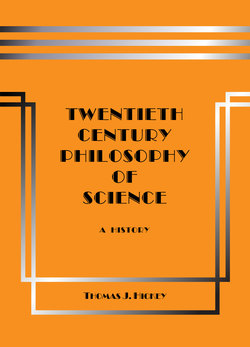Читать книгу Twentieth-Century Philosophy of Science: A History (Third Edition) - Thomas J. Hickey - Страница 49
На сайте Литреса книга снята с продажи.
3.18 Rejection of the Observation-Theory Dichotomy
ОглавлениеAll descriptive terms are empirically underdetermined, such that what the positivists called “theoretical terms” are simply descriptive terms that are more empirically underdetermined than what the positivists called “observation terms”.
One of the motivations for the positivists’ accepting the observation-theory dichotomy is the survival of the ancient belief that science in one respect or another has some permanent and incorrigible foundation that distinguishes it as true knowledge as opposed to mere speculation or opinion. In the positivists’ version of this foundational agenda observational description is presumed to deliver this certitude, while theory language is subject to revision, which is sometimes revolutionary in scope. The positivists were among the last to believe in any such eternal verities as the defining characteristic of truly scientific knowledge.
More than a quarter of a century after Heisenberg said he could observe the electron in the Wilson cloud chamber, philosophers of science began to reconsider the concept of observation, a concept that had previously seemed inherently obvious. On the contemporary pragmatist view there are no observation terms that receive isolated meanings merely by simple ostension, and there is no distinctive or natural semantics for identifying language used for observational reporting. Instead every descriptive term is embedded in an interconnected system of beliefs, which Quine calls the “web of belief”. A relevant subset of the totality of beliefs constitutes a context for determining any given descriptive term’s meaning, and a unilingual dictionary’s relevant lexical entries are a minimal listing of a subset of relevant beliefs for each univocal term. Thus the positivists’ thesis of “observation terms” is rejected by pragmatists.
Quine said that all descriptive terms are empirically underdetermined, such that what the positivists called “theoretical terms” are simply descriptive terms that are more empirically underdetermined than what the positivists called “observation terms”. All descriptive terms lie on a continuum of greater or lesser degree empirical of underdetermination. Contemporary pragmatists view the positivist problem of the reduction of theoretical terms to observation terms as a pseudo problem.
